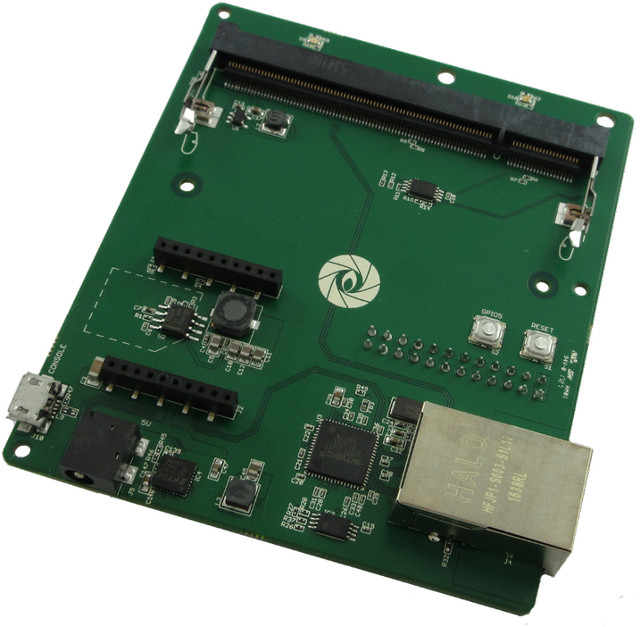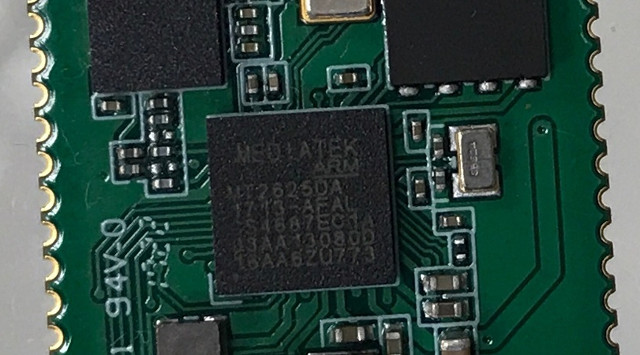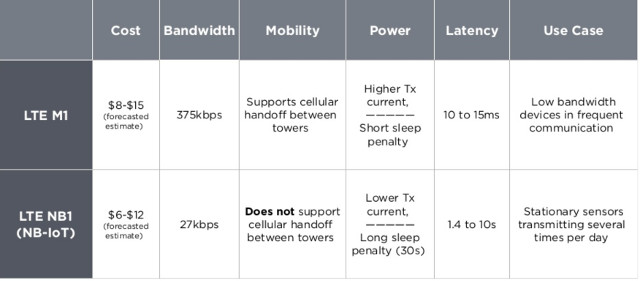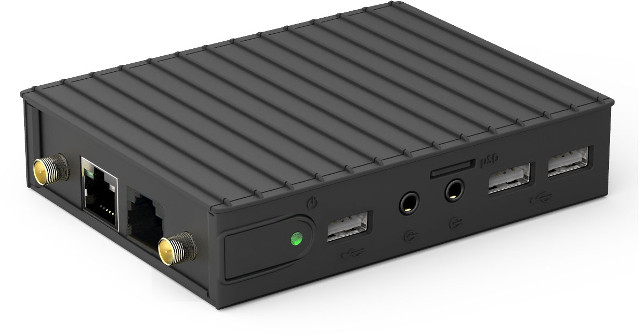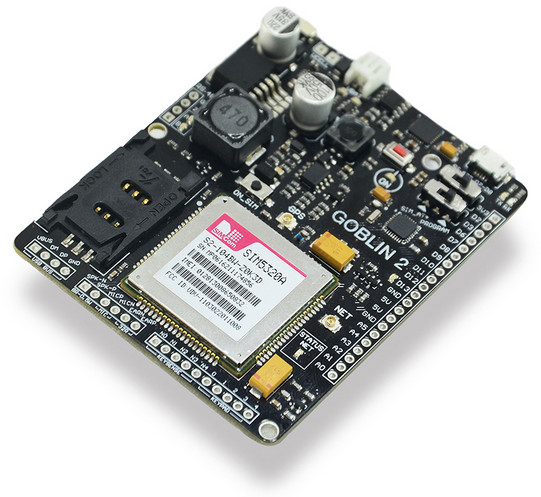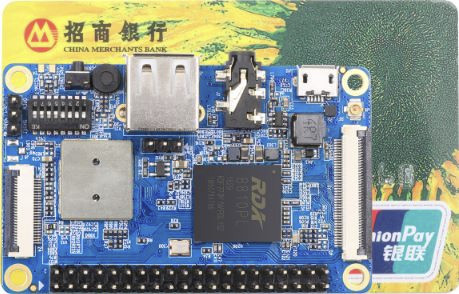Gumstix has designed Pi Conduit Gateway baseboard for both the Raspberry Pi Compute Module and RisingRF RHF0M301 LoRa gateway module, in order to create a Linux based LoRa gateway that can optionally support LTE or other cellular connectivity via NimbeLink Skywire cellular modem. Conduit Pi LoRa Gateway board specifications: 200-pin SO-DIMM connector for Raspberry Pi Compute Module / Raspberry Pi 3 Compute Module (CM3 / CM3L) Headers for RisingRF RHF0M301 LoRa Module NimbeLink Skywire 2G/3G/4G cellular modem connector Low profile 10/100M Ethernet jack (implemented via USB 2.0) USB – 1x micro USB port for debugging via an FTDI USB to TTL chip Misc – User (GPIO5) and reset buttons Power Supply – 5V via power barrel The board was designed using Geppetto, which means you should be able to customize it to your needs by modifying it the original design in a web browser, and order your brand new custom […]
Mediatek MT2625 NB-IoT SoC is Designed for Cellular IoT Devices working Worldwide
Mediatek has recently unveiled MT2625 SoC based on an ARM Cortex-M core, equipped with an NB-IoT “WorldMode” modem allowing for a single design worldwide, and supporting the latest 3GPP Release 14 (LTE Cat NB2) specification. Mediatek MT2625 specifications: CPU – ARM Cortex-M @ up to 104 MHz with FPU Embedded Memory – 4MB PSRAM Storage – 4MB NOR Flash Connectivity NB-IoT compatible with 3GPP Release 14 Full frequency band (450MHz to 2.1GHz) of 3GPP R13 (NB1) and R14 (NB2) standards Integrated baseband, RF, and modem DSP Peripherals – I2C, I2S, PCM, SDIO, UART Power Supply – Integrated PMU The solution will be found in products for worldwide transportation, municipal use, and consumer products, with a much longer battery life compared to existing devices relying on other 2G/3G/4G standards. According to the press release, one of the first module based on MT2625 has been designed in collaboration with China Mobile, integrates […]
Hologram LTE Software-Defined Global Network for Cellular IoT Projects Starts at $0.40 per Month per Device
Cellular connectivity can be rather expensive, and in the IoT realms, new LTE standards are still evolving and you may want to manage your own mini cellular network, so ideally we would need a provider that offers both low cost and flexibility. Hologram LTE network does both as it’s a software-defined network, and pricing starts at $5 for the SIM card and $0.40 per month per device. The company also just announced that their network was available for global deployment with the service available in more than 170 countries via partnerships through over 200 cellular carriers. The SIM card supports automatic roaming and carrier switching, and spacebridge inbound tunnel access allows for secure remote programming and device management. The SIM card specifications are as follows: 2G/GPRS, 3G HSPDA, 4G LTE Read/Write Cycles: Min. 500,000 Operating Temperature: -25°C ~ 85°C Data Retention: Min. 25 years at 25°C Triple-cut for Mini, Micro, […]
The Future of Cellular IoT Explained – LTE M1, LTE NB-IoT, eSIM, and Battery Life Hype
Telecom companies also want their share of the IoT business, but with 2G to 4G cellular technology often being too power hungry and/or expensive for this market, 2G on-going – or upcoming – sunset depending on your location, LTE Cat M1 and LTE Cat NB1 (aka NB-IoT) standards have been developed, and used in products like Pycom FiPy board, and SARA-R4 and SARA-M2 modules. If you want to have an overview learn about the new LTE IoT standards and the future of cellular IoT, Particle has published a useful presentation – embedded below – dealing with both, as well as eSIM (Embedded SIM), 2G sunset, and battery life expectations. The main takeaways from my reading of the presentation: LTE NB1 is better suited for low power stationary sensors transmitting a small amount of data a few times a day. Requires new hardware and software LTE M1 can be used for […]
Compulab IOT-GATE-iMX7 is an NXP i.MX7 IoT Gateway for Industrial Applications
CompuLab has introduced IOT-GATE-iMX7 compact fanless IoT gateway and industrial controller built around the company’s CL-SOM-iMX7 system-on-module, and offering Ethernet, WiFi, Bluetooth, 3G and Zigbee connectivity.Compulab IOT-GATE-iMX7 gateway specifications: SoC – NXP i.MX 7 dual ARM Cortex-A7 processor @ up to 1GHz with ARM Cortex-M4 core @ 200Mhz, 2D graphics engine System Memory – Up to 2GB DDR3L-1066 Storage – Up to 32GB on-board eMMC + micro-SD socket Connectivity Dual Gigabit Ethernet Dual band WiFi 802.11 a/b/g/n Bluetooth 4.1 BLE Optional 3G cellular module via mini PCie socket Optional ZigBee NXP JN5168 module Display – DVI up to 1920×1080 using a HDMI connector Audio – 3.5mm jacks for stereo line out, stereo line in USB – 4x USB2.0 host ports, type-A connectors Serial – 1x RS485 / RS422 port, RJ11 connector; 1x RS232 port, ultra-mini serial connector; 1x serial console via UART-to-USB bridge, micro-USB connector Expansion mini-PCIe socket, full-size embedded […]
Goblin 2 Arduino Compatible IoT Board Includes SIM5320A 3G & GPS Module
Veracruz, Mexico based Verse Technology has recently launched Goblin 2, an Arduino compatible IoT development, based on Atmel/Microchip ATmega328P MCU, featuring a built-in SIM5320A 3G and GPS module, supporting RS-485 communication, and providing 3.3/5 and 24V power output. Goblin 2 board specifications: MCU – Microchip Atmel ATMega328P AVR MCU @ 16 MHz with 1KB EEPROM, 32kB Flash, 2kB SRAM Wireless connectivity via Simcom SIM5320A USB 2.0 module: Dual-Band UMTS/HSDPA 900/2100MHz Quad-Band GSM/GPRS/EDGE 850/900/1800/1900MHz 1x SIM card slot High accuracy 16 channel GPS Expansion I/Os 6x ADC input with 10 bits resolution 10x digital in/out including 5 PWM RS-485 protocol @ 10Mbps for up to 256 nodes on the bus Header to Keypad, microphone and speaker for SIM I/O Misc – 8 LEDs for power, battery, networking, RS485, UART, plus one user LED; Power switch, RS-485 /GPIO switch, program / SIM AT+ switch Power Supply – 5V via micro USB port, […]
$99 Ping is a Tiny GPS Tracker that Works with Bluetooth and Cellular Connectivity (Crowdfunding)
Ping GPS Tracker is really small, last several months on a charge, and works with GPS, Bluetooth, and Cellular (GSM/EDGE or HSPA/UMTS) connectivity. It helps you track kids, pets, bags, keys, bicycles, cars or anything that may be lost or stolen using your iOS or Android smartphone. Ping GPS tracker specifications: Connectivity HSPA/GSM module + embedded 3G module Bluetooth Low Energy module GPS + GLONASS module Sensor – 3-axis accelerometer Misc – Inset tactile button for check-in & SOS, LED activity indicator Battery – 300 mAh custom lithium ion battery good for about 3 months Dimensions – 34 x 34 x 12 mm (PMMA silicone & elastomer materials) Weight – About 30 grams Waterproof – Up to 10 meters You’d use GPS + cellular connectivity when you are far from the tracked asset, and Bluetooth to locate it when it’s close. A button allows for your kid to send a […]
Orange Pi 2G-IOT Board Based on RDA8810PL Cortex A5 Processor to Support Bluetooth and GSM
[Update: The board featured below was initially announced as Orange Pi Zero Plus, but considering it may have confused people as it is not at all compatible with Orange Pi Zero, it has been renamed to Orange Pi 2G-IoT] Linaro mentioned Orange Pi i96 board last fall at Linaro Connect US. It was supposed to be a $9.99 board powered by an RDA Micro Cortex A5 processor with 2Gbit RAM and 4Gbit NAND flash on-chip. There has not been any news since then, but Shenzhen Xunlong has apparently gone ahead with an RDA Micro Cortex A5 board since they’ve posted some pictures of Orange Pi Zero Plus (Note: very slow server) with an RDA Micro ARM Cortex A5 processor. Orange Pi 2G-IoT preliminary specifications: SoC – RDA Micro 8810PL ARM Cortex A5 processor @ up to 1.0 GHz with 2Gbit (256 MB) on-chip LPDDR2 RAM, 4Gbit (512 MB) on-chip SLC […]


